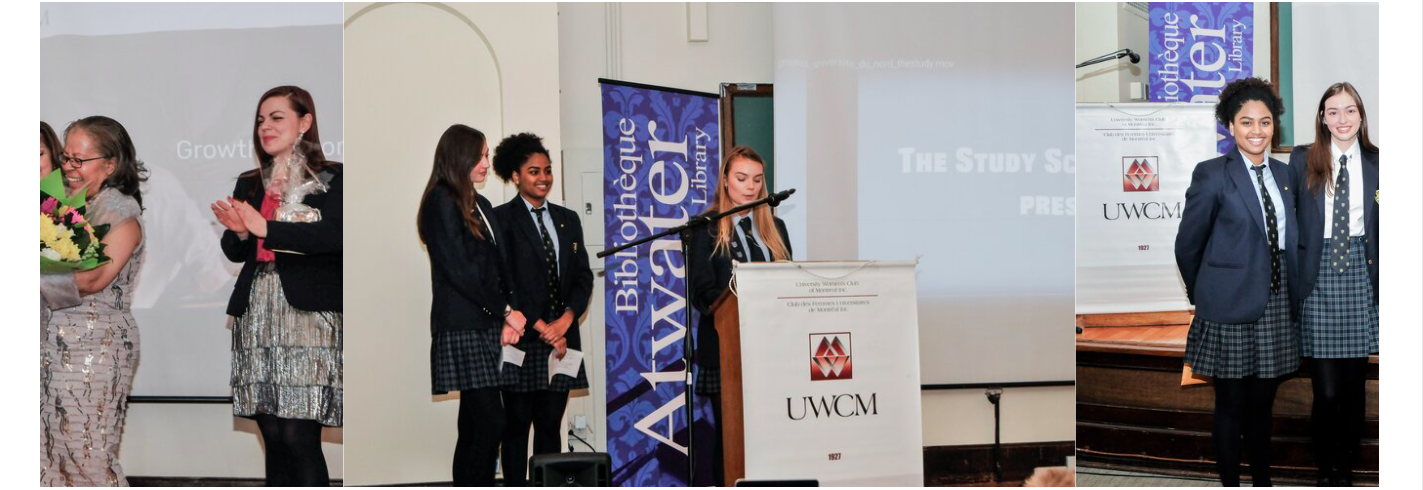
2017-2018 edition
Theme
Voices of Olympia Canada school competition theme aligns with the goals of the United Nations’ 2030 Agenda for Sustainable Development. The first edition reflected one of the UN review themes which were debated at at the Sixty-Second Session of the UN Commission on the Status of Women (CSW 62), held in New York on March 2018. Participants to this school competition were invited to reflect on :
"How access to information technology can contribute to the empowerment of Indigenous girls and women in Canada"
Winners
First prize
The first prize was awarded to the Villa Maria College team, composed of: Aristi Constantopoulos, Eleanor Fenner, Julia MacDonald Edström, and Dalia Vita, for their project: Using Raspberry Pi Technology to
Disseminate Mental Health Information Amongst Nunavummiut Girls and Women.
Second prize
The second prize, with a Jury Mention for Best Essay , was awarded The Sacred Heart School of Montreal team, composed of: Daphne Giroux, Katalina Toth and Daisy Smith, for their project: Aboriginal women and empowerment via technology.
Second prize ex-aquo
The second prize, ex-aquo, was awarded to the Study team, composed of: Lily Magny, Eloise Valasek, Lola Gomez-Ribeiro, Morgan Geyer, Cayla Cohen and Mia Strack, for their project: Université du Nord.
Third prize
The third prize was awarded to The Study team, composed of: Isabella Walter, Jocelyn Ha, Delila Farias, Vivian Maas, and Lauren McKenzie, for their project: The Importance of Education for Ikaluit Youth.
Testimonies
“My participation in the Olympes de la Parole school competition provided an opportunity to understand the gaps in the Canadian social service system. I am now enrolled in McGill University’s School of Social Work, where I am continuing to develop an understanding of ways in which such systems can be improved through policy.”
— Dalia Vita, Villa Maria College team member, (2018).
“Olympes de la Parole encouraged us to find ways of using simple technology to do the most good for Indigenous girls and women. This influenced my decision to start my university studies in the STEM field, to provide technological advancements that help the communities that need them”
— Aristi Constantopoulos, Villa Maria College team member, (2018).
“I described the experience to someone as, floating 3 feet above ground because it was so uplifting.”
— C. Hayes, CFUW-VP International Relations (2018).
“This has been an incredible experience for us all. The girls have learned invaluable lessons about practical matters, such as the research, writing, and presentation processes, but above all, they got to exercise their innate compassion. As a teacher, witnessing their evolution as women, as leaders, and as compassionate, socially conscious citizens, has made this experience the gift of a lifetime.”
— M. Di Scala, lead instructor at Villa Maria College, (2018).
“I can’t tell you how warming to the heart it was to see my Mohawk people involved in the opening and closing of the event. I was inspired by the energy these young women put towards solving pressing issues faced by Indigenous women in the North.”
— K. Cook, Special Advisor, Indigenous Initiatives, Office of the Provost and Vice-Principal (Academic), McGill University, (2018).
“When I hear what these young girls have to propose, I see a model of how to reconcile relationships between Canadians and the original people of this land.”
— D. Kahwinehtha Diome, Chairperson for Kahnawake Combined School Committee and member of the competition review panel, (2018).















